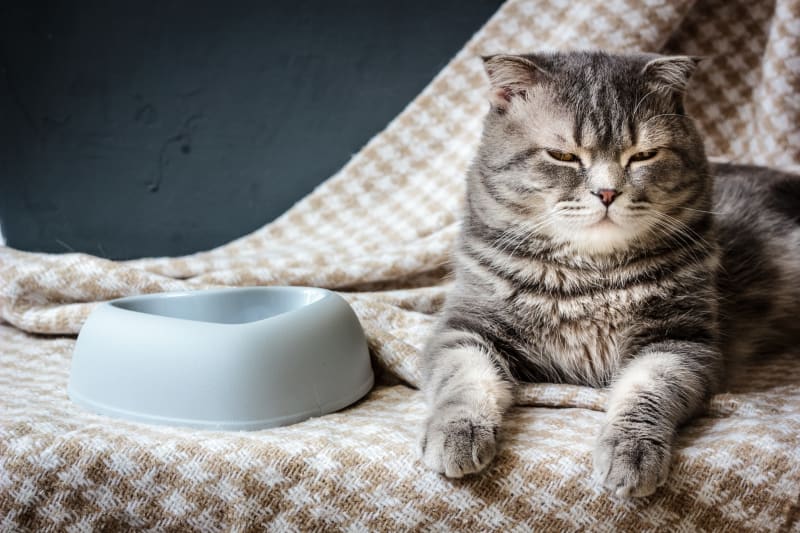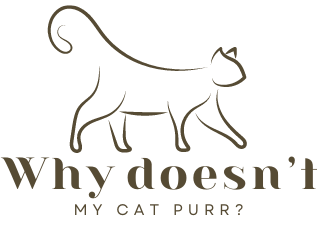Why is my cat not eating?

While cats’ picky eating habits are often joked about, the reality is that a cat refusing to eat can be a serious issue.
Unlike some other pets, such as dogs, when cats don’t eat enough, it can have particularly dire consequences. Without sufficient food intake, cats rely on their fat reserves for energy. However, before these reserves can be utilized, they must be processed by the liver, a process that demands adequate protein levels.
When a cat experiences rapid weight loss due to lack of eating, its protein stores are quickly depleted, and the liver becomes overwhelmed by the excess fat. This can lead to a dangerous condition called hepatic lipidosis, ultimately resulting in liver failure.
A decreased appetite in cats is often a sign of underlying illness, making it crucial to seek veterinary advice promptly upon noticing any changes in eating habits. The sooner the issue is addressed, the more effective interventions can be implemented to aid the cat’s recovery.
Why Your Cat Won’t Eat
There are various reasons why your cat may refuse to eat, and it’s important to pay attention to these signs as they could indicate an underlying issue.
Illness is often the culprit behind a loss of appetite in cats. Conditions such as infections, kidney failure, pancreatitis, intestinal problems, and even cancer can all lead to a decreased desire to eat. However, not all instances are serious – something as seemingly minor as a toothache can also cause a cat to stop eating.
If you noticed your cat’s loss of appetite shortly after receiving routine vaccinations, it’s possible that they’re experiencing a negative reaction to the shots. While vaccines are generally beneficial, they can cause side effects in some animals, including temporary and mild loss of appetite.
Environment
Changes in environment or routine can also affect a cat’s appetite. Like many creatures, cats thrive on routine, so any disruption to their usual schedule can lead to a decrease in food intake. Additionally, some cats may experience motion sickness during travel, resulting in nausea and reluctance to eat.
Psychological factors can also play a role in a cat’s eating habits. Anxiety, depression, or simply being a picky eater can all contribute to a refusal to eat. Cats are sensitive animals, and changes in their environment, such as the introduction of new people or pets, can impact their emotional well-being. Furthermore, adjusting to new types of food can take time for cats, so a recent change in diet could be causing reluctance to eat.
Other factors that may upset your cat and affect their appetite include excessive noise, the presence of other animals near their feeding area, dirty food dishes, or the proximity of their food dish to their litter box. Keeping these considerations in mind can help address your cat’s reluctance to eat and ensure their overall well-being.
Weight loss in cats

Sudden weight loss in cats is typically a red flag for an underlying health concern. If the weight loss occurs gradually, it might not be immediately noticeable, especially in long-haired cats. Regularly weighing your cat and conducting physical condition checks can help detect changes early, prompting timely veterinary attention. Here are some potential reasons for sudden weight loss in cats:
Diabetes
Cats with diabetes may experience weight loss along with changes in appetite. This disease can stem from either insufficient production of the hormone insulin or an impaired response to it. Additional symptoms may include increased water consumption, frequent urination, lethargy, urinary tract infections, and breath with a sweet odor.
Feline Infectious Peritonitis (FIP)
Particularly prevalent in cats raised in catteries, FIP is a viral infection known to induce wasting. Cats affected by FIP typically display signs of illness, including an unresponsive fever despite antibiotic treatment.
Gastrointestinal Disorders
Various gastrointestinal conditions can lead to weight loss in cats. Alongside weight loss, affected cats may exhibit symptoms such as diarrhea, decreased appetite, and vomiting. Common gastrointestinal issues contributing to weight loss include inflammatory bowel disease, food allergies, and specific infections.
Being vigilant about changes in your cat’s weight and behavior can aid in early detection and prompt intervention, ensuring optimal care and management of any underlying health issues.
Intestinal parasites, commonly known as worms, can be a potential cause of unintentional weight loss in your cat. While symptoms may not always be evident, these parasites can also lead to diarrhea, bloating, vomiting, and difficulty breathing.
Organ failure is another factor to consider, particularly in elderly cats who are prone to losing weight. Determining the exact cause can be challenging, especially as metabolism changes with age. Conditions such as kidney disease become more prevalent in aging cats. Your veterinarian can diagnose these issues through straightforward blood and urine tests.
